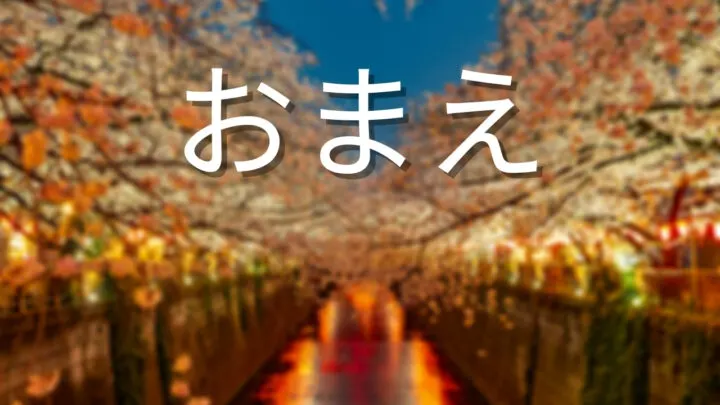Let’s talk omae today. This is a contentious and often misunderstood word in Japanese. Is it rude? Offensive? Friendly? Intimate? Just something said in anime and dramas?
This word shares good company with other pronouns in Japanese.
They’re hard to truly grok, and so, today, instead of overwhelming you with a discussion of a ton of different Japanese pronouns, I’m going to guide you through all the nuances of just one: omae.
As usual, let’s start with a birds eye view…
What is the meaning of omae in Japanese?
Omae (alternatively written おまえ or お前) is a pronoun meaning “you.” It is very informal. Because of this, when used between close friends it can be a sign of that closeness, but will come across as disrespectful, or even aggressive when used with people outside one’s inner social circle.
What does omae really mean, though?
Omae really isn’t that complicated when you get down to it. It’s just a simple pronoun meaning “you.” Technically, it’s no different from anata, kimi, kisama, or temee. But I don’t think you’re really interested in what’s “technically” true.
You want to know how words are used in a language. Ultimately, usage makes up a giant part of communication, and it’s not enough to simply comprehend a definition.
So, with that in mind, let’s discuss what omae really means in regular usage.
As we covered, it means “you.” But depending on who you say it to, it can mean “you jerk” or “you, my friend.” In English, we don’t really have these distinctions.
Some European languages do, though.
For example, Spanish has both tu and usted, and French has tu and vous. If I had to give an equivalent in English, it would be how we contract “you” into ya when we’re speaking quickly and in an informal situation.
Between peers, omae is simply informal and friendly.
From a boss to an underling, it’s condescending. From a stranger to a stranger it’s rude and very possibly aggressive.
It’s also typically more masculine leaning. Take that with a grain of salt—in fact, take it with a fistful of salt—especially as Japan increases the pace of its rapid socio-cultural changes.
That said, because of this masculine angle, the word can actually be a bit romantic when being spoken by a man to a (romantically interested) woman (let me get back to you if that works as well in queer relationships).
It signals their masculinity and strength and protectiveness.
Alright, I understand the use of omae and now I shall go forth and use it!
No, no you don’t. I don’t. Heck, even Japanese people would be hard pressed to fully express the full extent of the use of the word.
Let me give you a fantastic rule of thumb…
Avoid pronouns altogether.
Yup, you heard me. For my native English speakers out there, this might be really disorienting. Even for my European language speakers out there, this pushes things to the next level.
In English, the person must be specified. In Spanish, you can usually leave out the pronoun, as long as your verb is conjugated properly.
In Japanese, you go by context 95% of the time. For 4 of the 5% remaining, you’ll prefer to use the actual name of the person to indicate who you’re talking about.
The lines of distinction between these forms are thin and difficult to see.
So, unless you’re a Japanese master, avoid using omae in real life. If you’re a Japanese master, you probably don’t need this article to begin with.
This article will help you understand how it’s used in the world around you and in media. It won’t help you understand 100% how to use it. Only real-life experience will show you that.
Or, if you really want to venture into the great unknown, then do it loins firmly girded. There will be embarrassment and misunderstanding. Be prepared.

How is omae pronounced and written?
Omae can be written and said quite a few different ways. In hiragana it is written おまえ. In pure kanji it’s written 御前. It’s often written as a combination as お前.
However, it’s never written as 御まえ—not for any serious reason, it just feels weird to do it that way.
If you wanted to make it more intense, you could write it in katakana, and even change the pronunciation a bit: オメー.
So, what is the pronunciation anyway? The standard way to pronounce it sounds almost like “oh my.” If you wanted to pronounce it the intense way, you’d go with “oh may.”
Breaking down the kanji in omae
As noted above, omae can be written with two different kanji. But what do those characters mean?
Let’s start with the first one, 御.
Oh man, why did I start with this one? It’s a confusing bit of history—seriously, go check out the wiki entry on it! The short form is that it was taken from Chinese about one and a half millennia ago. In Japanese, it used to be a prefix indicating a “god.”
From there it became a prefix indicating utmost reverence and respect. Then, by the 1300s it reached a position resembling its current usage, wherein it was used to refer to some object relating to the listener in an honorable way.
Nowadays it is often attached to many nouns to make them more respectful. You’ll also hear it pronounced go.
The second kanji is 前, which means “in front.” Long, long ago in ancient China, when this character looked nothing like it does today, it was represented by a foot stepping on a boat, launching forward. Hence, “in front,” “forward.”
There’s an alternative origin story for this one, native to Japan in this case. This theory suggest a combination of 目 and 方 into 前. 目 meaning “eye,” and 方 meaning “towards.” Ergo, “towards the eyes.” Aka, “in front of.”
However you wanna slice it, 御前 basically means “honorable one before me.”
Where does omae come from?
If you’ve read the article on this site about kisama then the story surrounding omae will sound strangely familiar.
So, basically, omae was originally a way to refer to nobles and other high-born persons, or even gods.
This super-polite version was used through much of the Edo period, but by the time the Meiji period rolled around, and the country opened up (so, around 1868 or so), the term was decidedly used with peers and those you wanted to talk down to.
That said, you will still find it used in religious situations. It’s fairly normal for religious institutions to hold onto traditional ways of speaking, even when they’ve long phased out of use or even changed meaning entirely.
Are there other forms of omae?
One way to soften omae a bit is to add a san to the end. Perhaps you’re a teacher speaking to a student.
You want to express your standing over them, but not be too serious about it. Omae-san is the phrase for you (still, use it sparingly).
You may also read or hear the expression omae-sama.
Sama is similar to san in that it’s an honorific that goes on the end of a name or pronoun to elevate the respect shown by the speaker to that person.
Sama is a step above san. That said, my research shows that omae-sama isn’t used anymore. You may still hear it, though, if you watch tv or movies that take place in the past.
Next, we can make omae a plural. Creating the plural of omae is pretty straightforward if you’re familiar with pluralization in Japanese in general.
There’s omae-domo which sounds really unfriendly. Then there’s omae-ra, which is pretty standard, if a little casual. Then we get omae-tachi, which feels very even toned. And, finally another archaic term (like omae-sama), omae-gata.
Some example sentences for omae
Any omae homonyms to watch out for?
You need to watch out for just two related words. One is 大前, which is technically pronounced differently than omae, but most people who don’t speak Japanese well can’t hear the difference.
お前 is pronounced “oh my.” 大前 is pronounced “ohh my.” See, that “o” vowel is elongated.
And what does 大前 mean? It has the kanji for “big” and “in front of,” respectively, and it’s a noun referring to being in the presence of a god.
Let’s turn up the confusion a bit. This is sort of a transitively related word. There’s 大前提, which is pronounced dai-zen-tei (isn’t Japanese fun? Oi vey…).
This word means, like, a basic premise. A foundational assumption. A thing that goes without saying.
In this case the kanji are “big,” “in front of,” and “propose.” So, basically, your big forward-facing proposition.
Final thoughts on omae
Keep these thoughts in the back of your mind when listening to to reading Japanese. It’s a tricky and potentially sensitive word, so don’t use it until you’re absolutely certain you can do so without hurting anyone’s feelings or starting a ruckus.
In order to reach that level of confidence no amount of articles on the internet or book from the library will get you there. You’ll need experience. Now, omae, get out there and listen to some Japanese!

“I’ve lived in Japan on-and-off for the last five years, travelling to (almost) every corner of the Land of the Rising sun. I’ve deepened my love of the language with big hauls from Sapporo book stores, by chatting in Shinjuku coffee shops, drinking in Osaka “snack bars,” exploring distant Okinawan islands, and hitching rides with monks in Aomori. Japanese is a wide and deep language, and I’m always eager to dive in deeper.”

